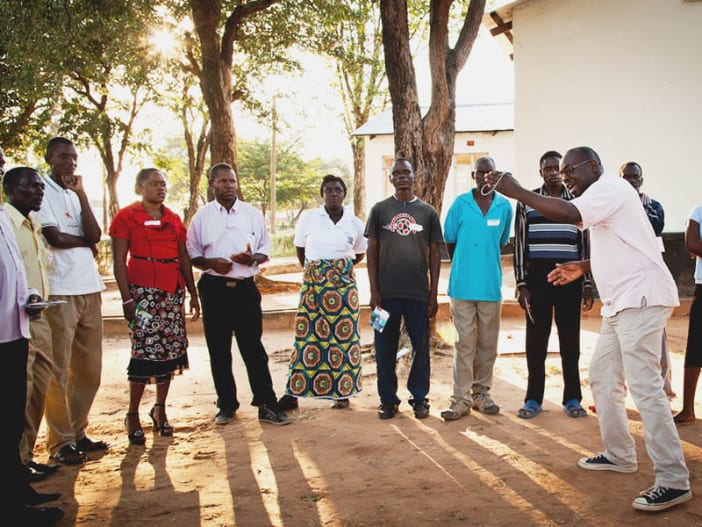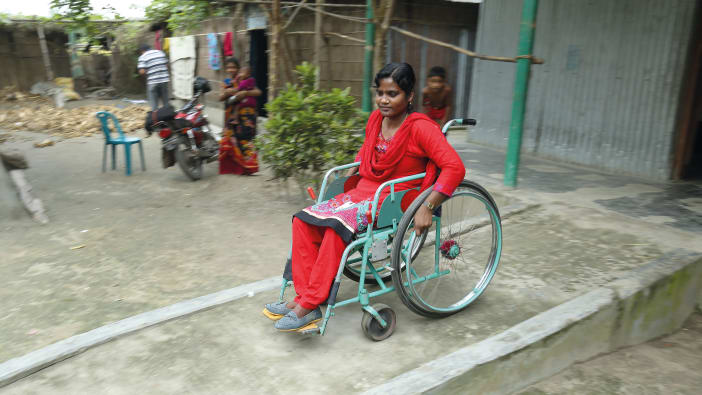by Aisha Yousafzai, Maria Kangere and Sheila Wirz.
A disability can result from many kinds of medical conditions and will limit the activities in which a person can participate. People with disabilities are frequently ignored by their communities. However, UNDP (United Nations Development Programme) figures suggest that, on average, 5% (1 in 20) of the population of most countries have either a moderate or severe disability.
There are many causes of disability. Medical help can improve certain disabilities – if it is available. Disabilities include:
- physical including disabilities at birth or from a later accident or illness, such as cleft palate, polio syndrome or spinal injury from a road accident
- deafness or blindness either from birth or disease _ emotional as a result of stressful experiences, neglect or abuse
- learning difficulties resulting from brain damage.
Poverty or war may lead to a higher number of disabilities. In richer countries there may be more older people with the disabilities of old age.
Why should I work with people with disability?
When making plans, whether for health, education, housing, sport or leisure, we should remember this often forgotten minority. We must remember that 5% of people will have special needs and they should be able to participate alongside people without disabilities.
The link between poverty and disability
Poverty and disability together can create a vicious circle. Despite efforts in countries such as Uganda, people with disabilities frequently have reduced opportunities for education and employment, resulting in poverty. A recent World Bank report suggests that disabled people may account for one in five of the world’s poorest people. The needs of poor people with or without disabilities are the same, including health, shelter, food and safety.
People with disabilities can become a dependent minority who are viewed negatively by the rest of their community. Alack of understanding about disability can lead to poor families investing a great deal of time and money in finding ‘cures’. Community programmes can shift their focus towards children’s ‘abilities’ rather than their ‘disabilities’. Rehabilitation services can help change people’s negative attitudes. For example:
- Providing appropriate aids to help people move about will allow greater independence and perhaps access to work.
- Training in activities for daily living can decrease the dependency of children with disabilities and release their parent’s time for other activities.
- Training in sign language enables deaf people to integrate with other people and become more confident, productive members of their community.
Future support and investment in specialised programmes is essential to ensure the specialised needs of people with disabilities are met.
Healthcare (eg: immunisation, nutrition) and education needs are the same for all people but evidence suggests that there are inequalities between people with disabilities and those without:
- Children with disabilities are more likely to die young, be neglected or poor.
- Children with disabilities are more likely to be malnourished.
- In some countries 80% of children with disabilities under the age of five may die.
- Less than 2% of children with serious disabilities in developing countries receive an education.
- Women with disabilities are 2–3 times more likely to be victims of physical or sexual abuse.
These inequalities need to be addressed to meet the human rights needs of people with disabilities. Their needs must be met and their views heard.
Community Based Rehabilitation (CBR)
Work to rehabilitate people with disabilities used to be seen as the responsibility of religious and charitable organisations. Later, rehabilitation was seen more as a medical issue. However in the past 20 years the idea of Community Based Rehabilitation (CBR) has developed.
The World Health Organisation (WHO) encourages CBR to be combined with primary healthcare. However, this may give too much emphasis to medical care, as only 2% of people with disabilities in developing countries have access to appropriate rehabilitation services. In recent years there has been a move away from rehabilitation programmes towards a ‘community development’ focus.
There are many different ways of considering CBR. These include:
Home based programmes Trained community workers provide rehabilitation activities for children and adults with disabilities in their own homes. These usually include physical or mental activities to improve people’s abilities. Most home based programmes also include training of family members (carers) in these activities.
Participating in community activities People with disabilities should be included within community activities. There needs to be a change in people’s attitudes towards disability. Children with disabilities need to be included in regular schools (whilst providing support to teachers to enable this).
Disability is linked to poverty There is a strong link between disability and poverty. Development programmes should therefore include appropriate plans to help people with disabilities.
Income generating activities are an important way to improve the position of people with disabilities in the community.
Disabled people’s organisations are one way of encouraging community services. People who themselves have disabilities can provide appropriate assistance and inspiration to others with disabilities.
Attitudes towards disability are the main problem. Other people’s views need to change and the best approach is by insisting on the human rights of people with disabilities.
Each of these viewpoints has supporters who believe passionately ‘their’ interpretation is ‘correct’. However in reality, most CBR programmes recognise that they need to include most of these aspects in their programme activities.
The quality of life for many people with disabilities is improving slowly. Their communities are more likely to appreciate their needs and consult them before making decisions that affect their lives. People with disabilities are now better able to participate into society.
The struggle continues …
Terms used
Nowadays certain terms are not normally used. These include ‘handicap’ and ‘disabled people’. Even the term ‘people with disabilities’ is becoming questionable and ‘activity limitation’ is recommended by WHO instead. The change in terms is generally to help improve attitudes. However, for the sake of understanding we have used the term ‘people with disabilities’ throughout this issue.
Aisha Yousafzai is a Research Fellow at the Centre for International Child Health (CICH) where she has recently completed her PhD investigating the nutritional status of children with disabilities in Mumbai, India.
Maria Kangere is a physiotherapist who has been working with people with disabilities in a CBR programme in Uganda, currently doing research in disability at CICH.
Sheila Wirz is a senior lecturer at CICH and heads the disability programme. She has worked with and for people with disabilities and their families throughout her working life, in the UK and South Asia.
CICH 30 Guilford Street London, WC1N 1EH, UK Tel: +44 (0)207 9052122 Fax +44 (0)207 404 2062
E-mail: [email protected]









